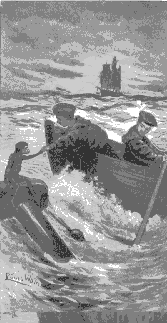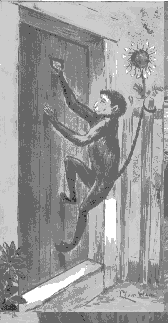Contents
| « Prev | Chapter II | Next » |
CHAPTER II
MR. DONALD MACALSH, gold-miner from Silver Creek, California, happening to be in San Francisco, read one morning the following paragraph in the San Francisco Herald:—
‘CURIOUS TALE OF THE SEA.—Captain J. E. Dawkins, of the Mermaid, which has just arrived in this port from Liverpool, reports a singular occurrence. About ten days’ out from home the look-out observed what he took to be a great sea-serpent, but which, on further inspection, turned out to be a quantity of wreckage. On approaching the spot the figure of a boy was distinctly observed clinging to the broken portion of a mast, and obviously still alive. A small boat was instantly lowered, the ship’s crew meantime making signals to the boy to inform him that he was being rescued. After a suspense of some half-hour the boat returned with the extraordinary intelligence that the figure seen was not that of a boy, but of a monkey. Search among the wreckage for human remains proved unavailing, and it is feared that a serious catastrophe has occurred. The only clue to the nationality of the vessel, which, it is only too plain, has met with a disastrous fate, are the letters “vorni“ on a portion of what had evidently formed the bow of one of the life-boats. Possibly these letters are part of “Livorni,” the Italian word for Leghorn, and the list of recent sailings from that port is now being scrutinised with some anxiety.’

The Monkey’s Rescue
Now what interested Donald—’Big Donald’ he was always called—in this story was not the monkey, but the arrival of the Mermaid. For the captain was a friend of his, and was bringing him some tools from home in this very ship. Though ‘Big Donald’ was now a gold-miner, he came out from Scotland when quite a lad. His father was a small farmer in Skye, and, dying early, the family emigrated to America. As it was to get these tools that Donald came in to San Francisco, he soon found his way to the harbour, and, finding out the Mermaid, walked on board. No one was visible on deck, so Donald sat down on a coil of rope to wait. He had not been there three minutes when a matted head and two very brilliant eyes suddenly shot up the companion, and a full-grown monkey sprang in front of him and stared into his face. Donald, much startled by this apparition, called out in a loud voice for the creature to go away; but the moment the words were spoken the monkey sprang on his back and clasped its long hairy arms about his neck. The miner shook it off in terror and tried to run ashore, but the monkey followed, frisking and gambolling round him, and chasing him all over the quay. Donald soon discovered, however, that the monkey meant no harm, and a few days later an explanation of this sudden outburst of interest in a stranger—the Captain told Donald that the monkey had never been known to behave like this before—broke in upon the miner’s mind. He remembered that when he suddenly spoke to the monkey he had called to it in Gaelic. Under the impulse of a sudden fear, I suppose, the language of his boyhood had started to his lips, and the words came out unconsciously ‘Imich air falbh,’ which means ‘Go away.’ What made Donald remember the circumstance was this, that whenever afterwards he used the Highland tongue the monkey manifested peculiar signs of joy. The only way the miner could account for this singular fact was to suppose that somehow or other this monkey had once belonged to some one who used the Gaelic language—a suggestion, however, which people generally laughed at. The miner always maintained, nevertheless, that the monkey really knew Gaelic, and he seldom spoke to it in any other language. Of course, people said this was simply to show off that he knew two languages.
I do not know whether the miner bought the monkey, or whether the Captain give it to him, or whether it ran away, but it is certain that from this hour it belonged to Donald. When he left the ship with his tools, the monkey followed, trotting after him like a dog all the way till he reached his lodgings. The miner then went into the house and shut the door, leaving the monkey outside. In ten minutes it seemed as if all the boys in San Francisco had gathered in that street. They formed a crowd round the door which almost stopped the traffic; and when the policeman shortly appeared, he was rather disgusted to find that it was only a monkey performing gymnastic exercises on a door-knocker.

A Monkey Performing Gymnastic Exercises
Roughly ringing the bell, he ordered Donald to take in his monkey. Donald replied meekly that he was not responsible for the monkey, but the officer said he would be summoned for ‘obstructing the thoroughfare and causing a breach of the peace’ if he did not take in his guest at once. So Donald had to submit, for he saw there would be no rest in San Francisco till this wayward creature had its will and was safe inside. That night Donald had a serious talk with the monkey as it sat upright in its chair at supper. He told it that if it would behave itself he would take it up to the Rocky Mountains to the gold diggings. The monkey seemed to understand, for it put down a lump of cheese it was about to eat, skipped off its chair, and nestled against Big Donald’s side. Only one other thing happened that night: Donald gave the monkey its name. He called it ‘Gum’—because it stuck to him.
| « Prev | Chapter II | Next » |